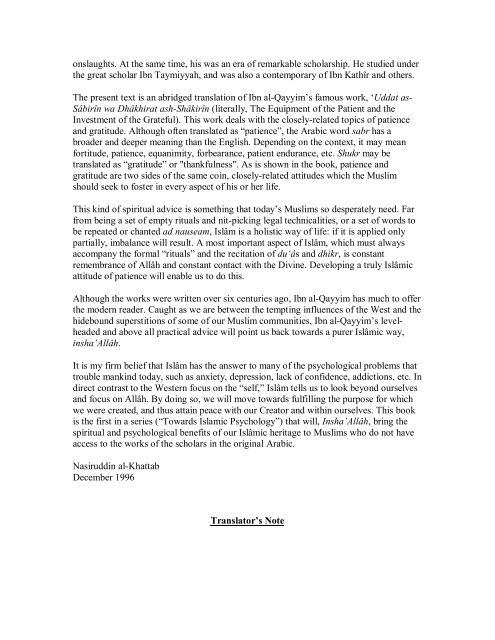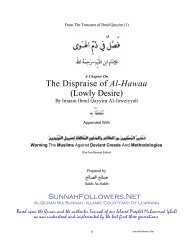Patience and gratitude - Al Quran wa Sunnah
Patience and gratitude - Al Quran wa Sunnah
Patience and gratitude - Al Quran wa Sunnah
Create successful ePaper yourself
Turn your PDF publications into a flip-book with our unique Google optimized e-Paper software.
onslaughts. At the same time, his <strong>wa</strong>s an era of remarkable scholarship. He studied under<br />
the great scholar Ibn Taymiyyah, <strong>and</strong> <strong>wa</strong>s also a contemporary of Ibn Kathîr <strong>and</strong> others.<br />
The present text is an abridged translation of Ibn al-Qayyim’s famous work, ‘Uddat as-<br />
Sâbirîn <strong>wa</strong> Dhâkhirat ash-Shâkirîn (literally, The Equipment of the Patient <strong>and</strong> the<br />
Investment of the Grateful). This work deals with the closely-related topics of patience<br />
<strong>and</strong> <strong>gratitude</strong>. <strong>Al</strong>though often translated as “patience”, the Arabic word sabr has a<br />
broader <strong>and</strong> deeper meaning than the English. Depending on the context, it may mean<br />
fortitude, patience, equanimity, forbearance, patient endurance, etc. Shukr may be<br />
translated as “<strong>gratitude</strong>” or "thankfulness". As is shown in the book, patience <strong>and</strong><br />
<strong>gratitude</strong> are two sides of the same coin, closely-related attitudes which the Muslim<br />
should seek to foster in every aspect of his or her life.<br />
This kind of spiritual advice is something that today’s Muslims so desperately need. Far<br />
from being a set of empty rituals <strong>and</strong> nit-picking legal technicalities, or a set of words to<br />
be repeated or chanted ad nauseam, Islâm is a holistic <strong>wa</strong>y of life: if it is applied only<br />
partially, imbalance will result. A most important aspect of Islâm, which must al<strong>wa</strong>ys<br />
accompany the formal “rituals” <strong>and</strong> the recitation of du‘âs <strong>and</strong> dhikr, is constant<br />
remembrance of <strong>Al</strong>lâh <strong>and</strong> constant contact with the Divine. Developing a truly Islâmic<br />
attitude of patience will enable us to do this.<br />
<strong>Al</strong>though the works were written over six centuries ago, Ibn al-Qayyim has much to offer<br />
the modern reader. Caught as we are between the tempting influences of the West <strong>and</strong> the<br />
hidebound superstitions of some of our Muslim communities, Ibn al-Qayyim’s levelheaded<br />
<strong>and</strong> above all practical advice will point us back to<strong>wa</strong>rds a purer Islâmic <strong>wa</strong>y,<br />
insha’<strong>Al</strong>lâh.<br />
It is my firm belief that Islâm has the answer to many of the psychological problems that<br />
trouble mankind today, such as anxiety, depression, lack of confidence, addictions, etc. In<br />
direct contrast to the Western focus on the “self,” Islâm tells us to look beyond ourselves<br />
<strong>and</strong> focus on <strong>Al</strong>lâh. By doing so, we will move to<strong>wa</strong>rds fulfilling the purpose for which<br />
we were created, <strong>and</strong> thus attain peace with our Creator <strong>and</strong> within ourselves. This book<br />
is the first in a series (“To<strong>wa</strong>rds Islamic Psychology”) that will, Insha’<strong>Al</strong>lâh, bring the<br />
spiritual <strong>and</strong> psychological benefits of our Islâmic heritage to Muslims who do not have<br />
access to the works of the scholars in the original Arabic.<br />
Nasiruddin al-Khattab<br />
December 1996<br />
Translator’s Note




